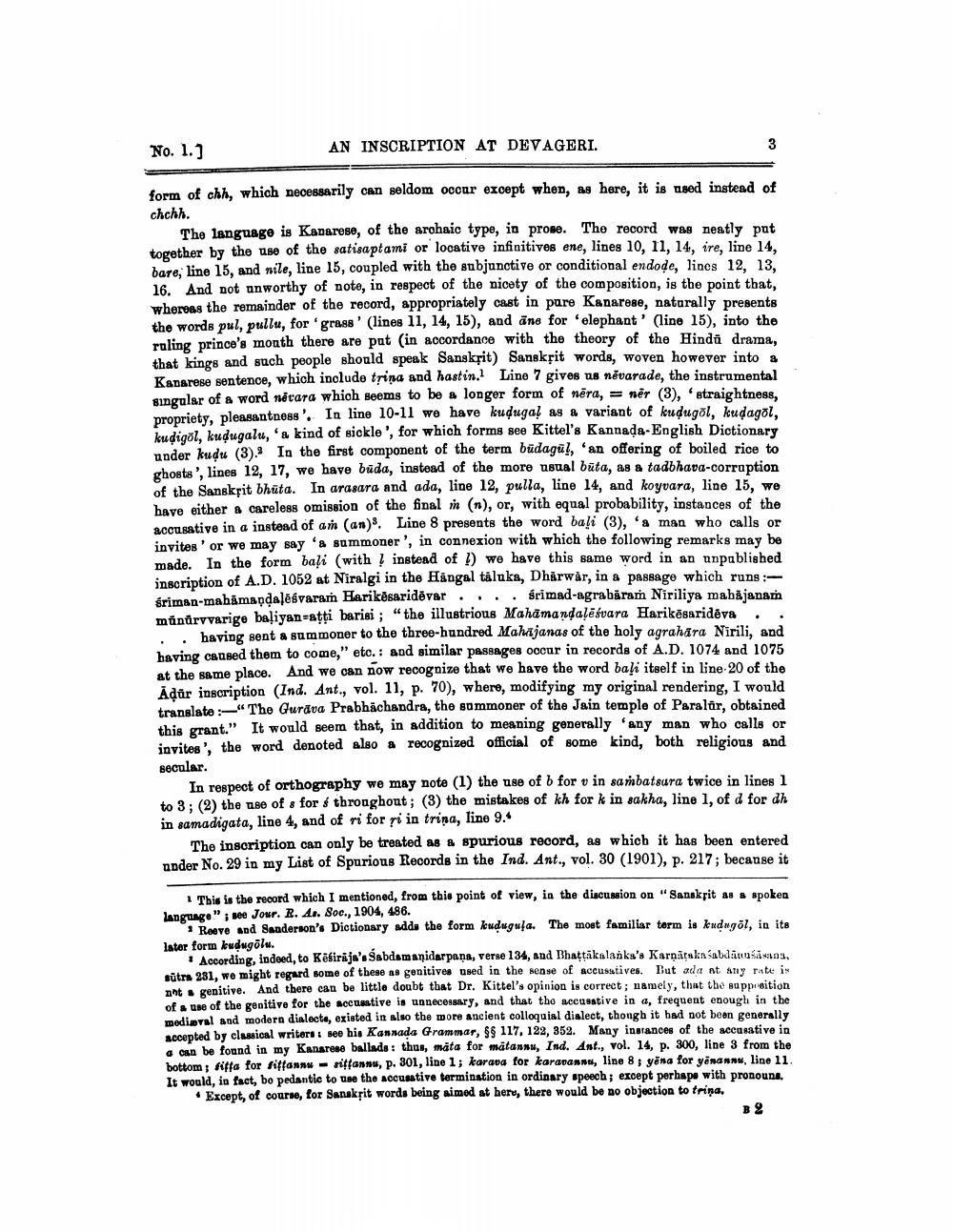________________
No. 1.]
AN INSCRIPTION AT DEVAGERI.
form of chh, which necessarily can seldom occur except when, as here, it is need instead of chchh.
The language is Kadarese, of the archaic type, in prome. The record was neatly put together by the use of the satisaptami or locative infinitives ene, lines 10, 11, 14, ire, line 14, bare, line 15, and mile, line 15, coupled with the subjunctive or conditional endodo, lines 12, 13, 16. And not unworthy of note, in respect of the nicety of the composition, is the point that, whereas the remainder of the record, appropriately cast in pure Kanarese, naturally presents the words pul, pullu, for 'grass' (lines 11, 14, 15), and ans for elephant' (line 15), into the ruling prince's month there are pat (in accordance with the theory of the Hindi drama, that kings and such people should speak Sanskrit) Sanskrit words, woven however into a Kanarese sentence, which include trina and hastin. Line 7 gives us nevarade, the instrumental singular of a word nocara which seems to be a longer form of nēra, =ner (3), straightness, nronriety. pleasantness'. In line 10-11 we have kudugal as & variant of kudugol. kudagol. kudigol, kudugalu, a kind of sickle', for which forms see Kittel's Kannada-English Dictionary under kudu (3). In the first component of the term būdagül, 'an offering of boiled rice to ghosts, lines 12, 17, we have būda, instead of the more usual būta, as a tadbhava-corruption of the Sanskrit bhūta. In arasara and ada, line 12, pulla, line 14, and koyvara, line 15, wo have either & careless omission of the final in (n), or, with equal probability, instances of the accusative in a instead of an (an). Line 8 presents the word bali (3), 'a man who calls or invites' or we may say 'a summoner', in connexion with which the following remarks may be made. In the form bali (with instead of !) we have this same word in an unpablished inscription of A.D. 1052 at Niralgi in the Hangal tāluka, Dharwår, in a passage which runs :Griman-mahamandalesvaram Harikësaridēvar.... Srimad-agrabaram Niriliya mahajanam münürvvarige baļiyan-atti barisi ; "the illustrious Mahamandalesvara Harikësarideva . . . having sent a summoner to the three-hundred Mahajanas of the holy agrahara Nirili, and having caused them to come," etc.: and similar passages oocur in records of A.D. 1074 and 1075 at the same place. And we can now recognize that we have the word basi itself in line 20 of the Ädür inscription (Ind. Ant., vol. 11, p. 70), where, modifying my original rendering, I would translate :-"Tho Gurava Prabhachandra, the sommoner of the Jain templo of Paralür, obtained this grant." It would seem that, in addition to meaning generally any man who calls or invites', the word denoted also a recognized official of some kind, both religious and secular.
In respect of orthography we may note (1) the use of b for v in sambatsura twice in lines 1 to 3; (2) the rise of for 6 throughout; (3) the mistakes of kh for k in sakha, line 1, of d for dh in samadigata, line 4, and of ri for fi in trina, line 9.
The inscription can only be treated as a spurious record, as which it has been entered ander No. 29 in my List of Spurious Records in the Ind. Ant., vol. 30 (1901), p. 217; becanse it
This is the record which I mentioned, from this point of view, in the discussion on "Sanskrit as a spoken langtungo"; see Jour. R. As. Soc., 1904, 486.
Reeve and Sanderson's Dictionary adds the form kudugula. The most familiar term is kudugöl, in its lator form kudugõlu.
1 According, indeed, to Kasiraja's Sabdamanidarpana, verse 134, and Bhattakalanka's Karnaaknabdauunas, Bütrs 231, we might regard some of these as genitives used in the sense of accusatives. But ada at any rate is not genitive. And there can be little doubt that Dr. Kittel's opinion is correct; namely, that the supposition of s use of the genitive for the accusative is unnecessary, and that the accusative in a, frequent enough in the medieval and modern dialecte, existed in also the more ancient colloquial dialect, though it had not been generally accepted by classical writers see his Kannada Grammar, SS 117, 132, 852. Many instances of the accusative in a can be found in my Kanarene ballads : thus, mäta for málanna, Ind. Ant., vol. 14, p. 300, line 3 from the bottom riffa for fiffann - miffann, p. 301, line 1; karava for karavanne, line 8 yöna for yönanaw, line 11. It would, in fact, bo pedantie to use the accusative termination in ordinary speech; except perhape with pronouns.
• Except, of course, for Sanskrit words being aimed at here, there would be no objection to trina.




